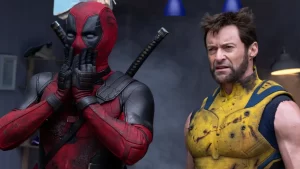Growing Up Is Hard To Do
A Film Review of Boyhood
Greetings readers! Hopefully you all had a good holiday season, but this is a new year and that means the Hollywood Award circuit is in full effect. The Academy released its Oscar nominees few days ago to what seems like an absolute love fest for Indie films. The bigger films starring bigger stars are low on this past year’s totem which can mean whatever you want it to mean, but when you look at the dollars and cents, it means 2014 was an off year for Hollywood. According to boxofficemojo.com 2014’s domestic take saw 5.2% less gross than 2013 and about the same percentage was down from the number of tickets sold. To be honest it’s not all about the money either. There was no “absolute must-see for everyone;” no true juggernaut that people should be aware of. So why not make it a year for the Indies to regain some prominence? 8 Films are nominated for Best Picture, and I will be reviewing them all for you right here at Cosmic Book News. I’ve already done one for American Sniper, up next is Richard Linklater’s experimental drama Boyhood.
Right away, if you note some sort of a stomach turning sensation with the term “experimental” being connected to a movie then rest easy; it’s a natural response. Thankfully this isn’t a film where the experiment at work isn’t self indulgence, hyper abstract imagery, elusive content or a mind-numbing thematic onslaught. Linklater directs the same cast over the course of 12 years in blocks of real time to capture his characters’ evolution, but also the physical growth of his cast to further enhance the realism. The narrative features a (surprise, surprise) coming of age tale of a young boy and his family amidst a bevy real life problems such as divorce, geographic displacement, alcoholism, bullying, peer pressure and parents trying their best to stay connected to their kids despite it all. Although this film is billed as charting new territory in the depiction of childhood, it also happens to be a calculated examination that pays much credence to the perspective of parents. Having also been written by Linklater, a personal touch of constant self reflection is apparent for most characters in every scene. The pacing is deliberate to present some of the most sincere vignettes of family life caught on camera despite the film being a fictional narrative. Like real life, this film isn’t always beautiful. In fact, it’s mostly ugly and awkward, but at least it doesn’t look bad on the screen. Worry not about home video style, handheld camera juggling. The cinematography is smooth, classic and dramatic. It prevents the dialogue from stealing the entire story, thus turning Boyhood into a really elaborate audio book.
12 years is a long time to keep a film in production for, even at a part time rate. Linklater and co. probably amassed a healthy amount of footage over that time period and this brings us to the first hurdle for the audience. This film has a runtime of 165 minutes and you will feel that time pass all too well. There are several moments in the plot where it felt like the drama would turn to heighten the danger as well as the tempo, but it never happens. Perhaps this was done to mimic mundane life too closely. There’s no question that a multitude of traps exist in life that can easily get small kids into big trouble, but to paraphrase Star Lord, if the kid really isn’t a complete dick (thank you parents), chances are they will veer from that kind of trouble. The lack of any defined or constant threat to any protagonist will defang any plot and the reality of Boyhood as a cinematic journey is that it reaches a certain level of intimacy and intrigue early on and then plateaus.
The various family crisis that are depicted in Boyhood never shows the audience any full and raw emotional outburst from anyone in the cast which further adds to the film’s overall monotone pacing handicap. The reason for this is that the story is actually being narrated to the audience through passive observations by the main character: Mason Jr. played by Ellar Coltrane. Right now, young master Coltrane is receiving much Hollywood love as his contributions are being hailed as “a breakthrough performance” and that would be correct if that description simply meant having a feature role in a film nobody saw coming. His performance exists, but is exceptional in no way other than having one of those “different” Hollywood looks that is neither overly pretty nor unattractive to justify him being there in the first place.
One of two explanations can account for this. First, Linklater specifically directed Coltrane to just pretend his scenes and remember his lines (which is fine for him as a young child, but doesn’t fly at all when he gets older) or two, Coltrane doesn’t really have it; i.e. the screen presence, the charisma, the “it” factor. Either way, Mason Jr. is our main character and he literally grows up for the audience onscreen from childhood to adolescence to young adulthood and the only thing he delivers is … the air of indifference. Unless a child is being fed mescaline, there is no way any realistic coming of age tale can feature the absolute absence of anger, bliss or any other possible emotion between the two. There is far too much neutered “whatever” attitude from Coltrane at every age that I simply stopped believing him as an actual participant in his own journey. There are far too many opportunities for Coltrane to unleash some very real angst as his character is put through more than enough trials to justify a clear path to becoming a sociopath. All things being equal, Mason is a pretty damn decent kid despite the circumstances and it actually feels weird. The only rationalization the audience has for Mason Jr.’s relative sainthood is the imperfect, yet sincere and constant parenting at work during his life.
Anyone can notice the effect of a veteran actor that’s engaged with his or her character in just about any kind of film. Such an effect is even more noticeable when veterans are matched up with complete novices as is the case between the adult and child cast members of Boyhood. Not enough credit can be given to both Patricia Arquette and Ethan Hawke for their work as the mother and father in this production for it is every scene they share with their children (Mason and Samantha) that completely blows away every other. These scenes make this film worth watching, period. Any actor will tell you that a performance is based on a give and take relationship with fellow cast members. Neither Arquette nor Hawke get much of anything from either Coltrane or Lorelei Linklater (Samantha) which requires them to “be the parent” for the film’s content as well as its context, but at least they take full advantage of their heavy lifting in each scene. Arquette as the mom is the disciplinarian so there is a certain stern responsibility that goes into her character, but she accomplishes this without becoming a dictator which is thanks to her tempered balance with maternal concern. This sincere balance is capable of masking both kids’ “deer in the headlights” demeanor as genuine moments of learning their lessons. Hawke as the every other weekend father is the cool jokester who wants to befriend his kids as much as he wants to dish out legitimate street smarts. His tact lulls the kids into pleasant comfort while still finding several moments to deliver important messages that transcend his own cavalier attitude and lifestyle.
Boyhood is an exceptional family film despite being rated R for language and adult situations, but even those never get graphic (no nudity) or violent (no onscreen striking). The content of the scenarios and the parenting dialogue take great pains to reproduce realistic situations that today’s families have to deal with. Watching this can be as rewarding to children with the appropriate adult supervision as it obviously will be for adults. The real trick is keeping everyone in the family in front of the screen before the credits roll because it is a slow moving picture. If you are up to the challenge, you will be rewarded with an education into the modern family featuring a unique, real life development of its cast that is seamless in its transition between ages. Perhaps this unique experiment regarding its production will be enough to win Oscar gold as the Best Picture, but limitations regarding its pacing and performances couldn’t make its chances better than any other for the win.







